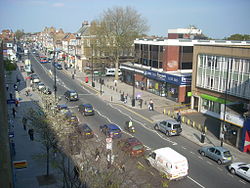Finchley
| Finchley | |
|---|---|
 Ballards Lane, Church End, Finchley |
|
| Finchley shown within Greater London | |
| OS grid reference | TQ255905 |
| London borough | |
| Ceremonial county | Greater London |
| Region | |
| Country | England |
| Sovereign state | United Kingdom |
| Post town | LONDON |
| Postcode district | N2, N3, N12 |
| Dialling code | 020 |
| Police | Metropolitan |
| Fire | London |
| Ambulance | London |
| EU Parliament | London |
| UK Parliament | |
| London Assembly | |
Finchley (/ˈfɪntʃli/) is an area of north London, England, in the London Borough of Barnet. Finchley is on high ground, 11 km (6.8 mi) north of Charing Cross. It formed an ancient parish in the county of Middlesex, becoming a municipal borough in 1933, and has been part of Greater London since 1965.
It is predominantly a residential suburb, with three town centres: North Finchley, East Finchley and Finchley Church End (Finchley Central).
Finchley probably means "Finch's clearing" or "finches' clearing" in late Anglo-Saxon; the name was first recorded in the early 13th century. Finchley is not recorded in Domesday Book, but by the 11th century its lands were held by the Bishop of London. In the early medieval period the area was sparsely populated woodland, whose inhabitants supplied pigs and fuel to London.
Extensive cultivation began about the time of the Norman Conquest. By the 15th and 16th centuries the woods on the eastern side of the parish had been cleared to form Finchley Common. The medieval Great North Road, which ran through the common, was notorious for highwaymen until the early 19th century.
St Mary-at-Finchley Church is first recorded in the 1270s. Near the northern gate to the Bishop of London's park, the hamlet of East End, later East Finchley, had begun to develop by 1365.
The Edgware, Highgate and London Railway (later the Great Northern Railway) reached Finchley in 1867. It ran from Finsbury Park via Finchley to Edgware. The branch from Finchley to High Barnet opened in 1872. In 1905 tram services were established in Finchley, and extended shortly afterwards to Barnet. They were eventually replaced by trolleybuses.
...
Wikipedia

